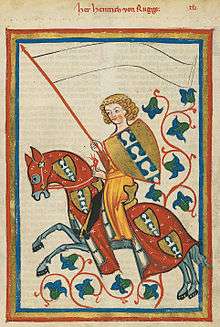Definify.com
Webster 1913 Edition
Caparison
Ca-par′i-son
,Noun.
[F.
caparaçon
, fr. Sp. caparazon
a cover for a saddle, coach, etc.; capa
cloak, cover (fr. LL. capa
, cf. LL. caparo
also fr. capa
) + the term. azon
. See Cap
.] 1.
An ornamental covering or housing for a horse; the harness or trappings of a horse, taken collectively, especially when decorative.
Their horses clothed with rich
caparison
. Drylen.
2.
Gay or rich clothing.
My heart groans beneath the gay
caparison
. Smollett.
Ca-par′i-son
,Verb.
T.
[
imp. & p. p.
Caparisoned
p. pr. & vb. n.
Caparisoning
.] [Cf. F
caparaçonner
.] 1.
To cover with housings, as a horse; to harness or fit out with decorative trappings, as a horse.
The steeds,
caparisoned
with purple, stand. Dryden.
2.
To adorn with rich dress; to dress.
I am
caparisoned
like a man. Shakespeare
Webster 1828 Edition
Caparison
CAPARISON
,Noun.
CAPARISON
, v.t.1.
To cover with a cloth.2.
To dress pompously; to adorn with rich dress.Definition 2026
caparison
caparison
English

Knight on caparisoned steed
Noun
caparison (plural caparisons)
- The often ornamental coverings for an animal, especially a horse or an elephant.
- 1861, Charlotte Guest, The Mabinogion/The Dream of Rhonabwy:
- And the green of the caparison of the horse, and of his rider, was as green as the leaves of the fir-tree, and the yellow was as yellow as the blossom of the broom.
-
- Gay or rich clothing.
- 1749, Tobias Smollett, The regicide:
- My heart groans beneath the gay caparison.
-
Translations
coverings for an animal, often ornamental
Verb
caparison (third-person singular simple present caparisons, present participle caparisoning, simple past and past participle caparisoned)
- To dress up a horse or elephant with ornamental coverings.
- 1593, Shakespeare, Richard III, Act 5, Scene 3.
- Come, bustle, bustle; caparison my horse
- 1593, Shakespeare, Richard III, Act 5, Scene 3.